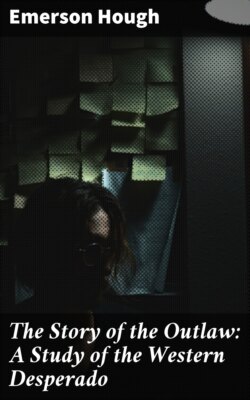Читать книгу The Story of the Outlaw: A Study of the Western Desperado - Emerson Hough - Страница 7
На сайте Литреса книга снята с продажи.
Chapter III
ОглавлениеTable of Contents
The Land of the Desperado—The Frontier of the Old West—The Great Unsettled Regions—The Desperado of the Mountains—His Brother of the Plains—The Desperado of the Early Railroad Towns.
There was once a vast empire, almost unknown, west of the Missouri river. The white civilization of this continent was three hundred years in reaching it. We had won our independence and taken our place among the nations of the world before our hardiest men had learned anything whatever of this Western empire. We had bought this vast region and were paying for it before we knew what we had purchased. The wise men of the East, leading men in Congress, said that it would be criminal to add this territory to our already huge domain, because it could never be settled. It was not dreamed that civilization would ever really subdue it. Even much later, men as able as Daniel Webster deplored the attempt to extend our lines farther to the West, saying that these territories could not be States, that the East would suffer if we widened our West, and that the latter could never be of value to the union! So far as this great West was concerned, it was spurned and held in contempt, and it had full right to take itself as an outcast. Decreed to the wilderness forever, it could have been forgiven for running wild. Denominated as unfit for the occupation of the Eastern population, it might have been expected that it would gather to itself a population all its own.
It did gather such a population, and in part that population was a lawless one. The frontier, clear across to the Pacific, has at one time or another been lawless; but this was not always the fault of the men who occupied the frontier. The latter swept Westward with such unexampled swiftness that the machinery of the law could not always keep up with them. Where there are no courts, where each man is judge and jury for himself, protecting himself and his property by his own arm alone, there always have gathered also the lawless, those who do not wish the day of law to come, men who want license and not liberty, who wish crime and not lawfulness, who want to take what is not theirs and to enforce their own will in their own fashion.
"There are two states of society perhaps equally bad for the promotion of good morals and virtue—the densely populated city and the wilderness. In the former, a single individual loses his identity in the mass, and, being unnoticed, is without the view of the public, and can, to a certain extent, commit crimes with impunity. In the latter, the population is sparse and, the strong arm of the law not being extended, his crimes are in a measure unobserved, or, if so, frequently power is wanting to bring him to justice. Hence, both are the resort of desperadoes. In the early settlement of the West, the borders were infested with desperadoes flying from justice, suspected or convicted felons escaped from the grasp of the law, who sought safety. The counterfeiter and the robber there found a secure retreat or a new theater for crime."
The foregoing words were written in 1855 by a historian to whom the West of the trans-Missouri remained still a sealed book; but they cover very fitly the appeal of a wild and unknown land to a bold, a criminal, or an adventurous population. Of the trans-Missouri as we of to-day think of it, no one can write more accurately and understandingly than Theodore Roosevelt, President of the United States, who thus describes the land he knew and loved.[A]
